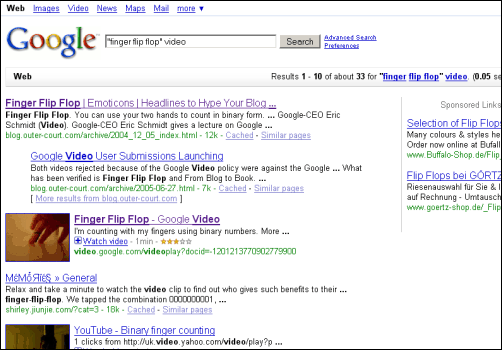Wednesday, May 23, 2007
Is the Google Video PlusBox Fair?
There’s an interesting imbalance being created by Google’s recent integration of videos right into their search results in the form of a PlusBox. For instance, when I search for finger flip flop video, a Google Blogoscoped blog entry containing a WMV video link is the top result in Google (this is the source of the video). However, the first result with a thumbnail of its own – likely to draw attention to the site linked – stems from Google’s own property, Google Video (where I additionally uploaded the video, though it would be just as likely that someone else had uploaded this if I hadn’t).
Now, Google doesn’t just add their own properties – they also add sites like MetaCafe for instance. But they fail to turn my linked WMV video into a screenshot to show next to the snippet. In result this means people may simply click the “Watch video” link right on the Google results page, thereby expanding the video to play immediately, skipping the originating video source. And this, in return, means they’ll be only exposed to the ads Google is displaying as opposed to the ads the blog is displaying.
We’re essentially left with two different conclusions: first, to complain that Google now takes too much content they don’t own onto their search results. By integrating full videos from YouTube, they expand the scope of copyright problems YouTube faces right into the Google search results, and also break with their old motto of sending users away as fast as possible. Quote Larry Page, interviewed by Playboy in September 2004 (my emphasis):
Q: Many Internet companies were founded as portals. It was assumed that the more services you provided, the longer people would stay on your website and the more revenue you could generate from advertising and pay services.
Larry: We built a business on the opposite message. We want you to come to Google and quickly find what you want. Then we’re happy to send you to the other sites. In fact, that’s the point. The portal strategy tries to own all of the information. (...)
We want to get you out of Google and to the right place as fast as possible. It’s a very different model.
There’s a different secondary conclusion. For instance, this blog shares all the content under a Creative Commons license, meaning a search engine would be explicitly allowed to display the full content (text, images, videos), provided it adheres to the license (which includes naming the source of the video, and republishing in a rather non-commercial way). This boils down to the realization that it’s hard to define copyright by location ever since the web came around. Everything’s a copy, from the moment something is displayed in the browser (a copy of the content you’re viewing is placed onto your computer’s cache when it’s downloaded) to Google’s search index (which copies the full content onto Google’s server) to Google image results (which displays arguably “fair use” copies of images to searchers). The conclusion for webmasters, bloggers and other content creators, thus, would be to make sure their content itself includes relevant information like its source (e.g. you watermark all your images & videos with your site’s URL), or they’re simply happy by the increased attention stream for their own site – or if nothing else, the distribution of their message – Google creates as by-product of making copies.
What do you think?
>> More posts
Advertisement
This site unofficially covers Google™ and more with some rights reserved. Join our forum!

